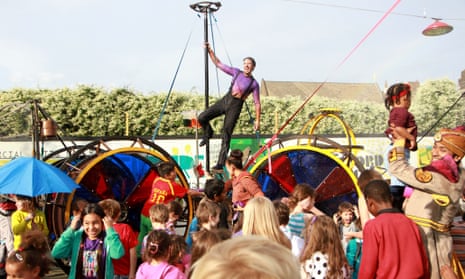In a week of arts policy fuss around the Warwick Commission report (pdf), and just before the 50th anniversary of Jennie Lee’s White Paper (A Policy for the Arts) with its dream of state support for arts for all, it’s possible to think we’re on the edge of abandoning arts subsidy entirely – of giving in to this government’s austerity lie that there isn’t enough to go around, and that “enough” is a dream anyway. But in the past year I have seen brilliant people all over the country motivated and enthused, willing to give of themselves and their time to put community first – to make a creative difference right where they live.
The 3,183 people across the UK who signed up to make local Fun Palaces last year did so for many reasons. For some the draw was the original, never-built Joan Littlewood and Cedric Price dream of one space to house all arts and all sciences – free and welcoming to all.
For some they were a way to research and develop new work without having to find a venue or audience. The makers of Fun Palaces tried out new material, new workshop ideas and new research on a willing public who came to them. For others the project was about creating something closer to home; often in the arts and cultural industries, we’re required to leave where we live to work in the bigger cities – in the places where more work is available. But there’s a real joy in contributing to our communities, right where we are.
For most, whatever their initial reason for getting involved, it was the local aspect that proved crucial: working with neighbours (many of them not already friends), local councillors and public buildings, often for the first time, to make great, inclusive work – and making it locally.
One of the things we’re proudest of with Fun Palaces is that it’s not about outside experts. Contrary to many subsidised engagement programmes, this project doesn’t fly in experts to make a difference. It does not look for experts to tell a group how best to function, nor does it believe that experts are best-placed to inspire communities to create their own arts and sciences events. We do not bring in world-class orchestras or top-ranking scientists to work with Fun Palaces; we couldn’t afford to, even if we wanted to – and we don’t want to.
The expert simply reinforces the idea that the artist is other. The local person, on the other hand – perhaps not well-known or known at all, but expertly and compellingly enthusiastic – is a role-model who says: “I am from here, I am like you and that means you can do this too.” The local enthusiast, rather than the flown-in expert, underlines the possibility that we can all be creative.
Joan Littlewood said she believed in the “genius in every person” – and we do too. We believe that everyone can make great work, in every field, and that what is lacking is not willing, hard work – nor the brilliance necessary for ordinary people to become expert – but opportunity and encouragement.
We believe that there’s a serious problem with the concept of excellence as it is currently used in arts subsidy. The excellence of artistic quality can only ever be a subjective value. All too often the standard applied is one that simply repeats what has gone before.
At Fun Palaces we want to do away with the idea of excellence and experts altogether, especially around subsidy, and demand instead an excellence of engagement and participation.
For many working in the cultural industries, arts engagement is still a tick-box exercise that involves little or no participation. It maintains the audience/artist dichotomy. It presents “excellence” as something to be watched, listened to and performed by someone from outside the community. It encourages a divide that sees artists as special or different. It means attainment of skill is something only for the “talented”.
But as long as we don’t allow everyone the opportunity to attempt all artforms, we cannot claim anyone is talented. As long as we’re not offering the same opportunities to all, we can’t know if talent even exists.
What we learned from our Fun Palaces pilot in 2014 was that the experts are already in communities, that excellence of engagement is far more valuable than a subjective excellence of artistic quality. We also learned that, given the chance, brilliant people want to do brilliant things for and with their own community, because our greatest resource is now, and always has been, people.
Real people, ordinary people, the people: the ones who know their own community’s needs and wants, because they live in it, offering engagement and participation far from Westminster, from the grassroots up.
Stella Duffy is a writer, theatre-maker and founder of Fun Palaces, 3–4 October 2015, registration for which opens today
Join our community of arts, culture and creative professionals by signing up free to the Guardian Culture Pros Network.

Comments (…)
Sign in or create your Guardian account to join the discussion